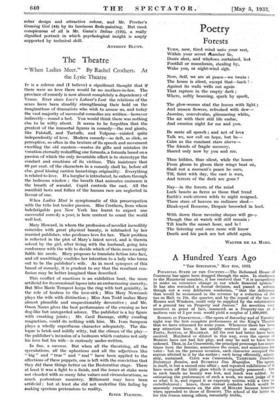A Hundred Years Ago
" THE SPEOTATOR," MAY 4TH, 1833.
FINANCIAL STATE or THE COUNTRY.—The Reformed House of Commons has again been dragged through the mire. In obedience to the Ministerial mandate, it has resolved that " it is inexpedient to make an extensive change in our whole financial system." It has also rescinded a formal decision, and passed a solemn though not a very deliberate resolution, " that the deficiency that would be occasioned in the revenue by a reduction of the tax on Malt to 10s. the quarter, and by the repeal of the tax on Houses and Windows, could only be supplied by the substitution of a general tax on Property and Income." An assertion very incorrect in point of fact, inasmuch as a Property-tax at a uniform rate of 5 per cent. would yield a surplus of 1,600,0001.
Rossnn zN PERPECTION.—The opera of Saturday and, of Tuesday night was the first complete performance at the King's Theatre that we have witnessed. for some years. Whenever there has been any attraction here, it has usually centered- in one singer,— PASTA, SONTAO, or MALmassr. All the rest had better have been omitted. Mutilated or diluted in this way, even the operas of Rossmn have not had fair play, and may be said to have been unheard. Thus, in La Cenerentola, the principal personage has some- times been the heroine, sometimes the count, and sometimes his valet : but on the present occasion, each character occupied the station allotted to it by the author ; each being efficiently, admin. ably, sustained. Cam was Cenerentola, TARBURINI Dandini, DONZELLI Ramiro, and ZucHELLI Don Magnifico. The opera, in itself, is but a second-rate affair ' • and repeated exhibitions of it have worn off the little gloss which it originally, possessed : but in such hands no beauty was lost, and much was added. In estimating the performance of such a work, we must judge of it as what it is, and regard it as expressly, written with a view to embellishment : hence, those eternal roulades which would be unseemly excrescences on the airs of MOZART become beauties when appended to those of ROSSINI. The school of the latter is, for this reason among others, essentially










































 Previous page
Previous page